
Hiram Warren Johnson was an American attorney and politician who served as the 23rd governor of California from 1911 to 1917 and represented California in the U.S. Senate for five terms from 1917 to 1945. Johnson achieved national prominence in the early 20th century as a leading progressive and ran for vice president on Theodore Roosevelt's Progressive ticket in the 1912 presidential election. As a U.S. senator, Johnson was a leading critic of the foreign policy of both Woodrow Wilson and Franklin D. Roosevelt.
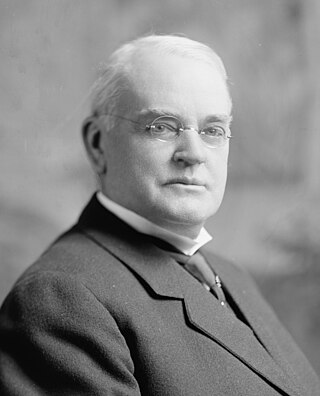
John Downey Works was an American politician and lawyer. He was a U.S. Senator representing California from 1911 to 1917, and an associate justice of the California Supreme Court from October 2, 1888, to January 5, 1891.

The 1988 United States House of Representatives elections was an election for the United States House of Representatives on November 8, 1988, to elect members to serve in the 101st United States Congress. They coincided with the election of George H. W. Bush as president. Although Bush won with a strong majority, his Republican Party lost a net of two seats to the Democratic Party, slightly increasing the Democratic majority in the House. It was the first time since 1960 that an incoming president's party lost seats in the House.

The 1912–13 United States Senate elections were held on various dates in various states. They were the last U.S. Senate elections before the ratification of the Seventeenth Amendment in 1913, establishing direct elections for all Senate seats. Senators had been primarily chosen by state legislatures. Senators were elected over a wide range of time throughout 1912 and 1913, and a seat may have been filled months late or remained vacant due to legislative deadlock. Some states elected their senators directly even before passage of Seventeenth Amendment. Oregon pioneered direct election and experimented with different measures over several years until it succeeded in 1907. Soon after, Nebraska followed suit and laid the foundation for other states to adopt measures reflecting the people's will. By 1912, as many as 29 states elected senators either as nominees of their party's primary or in conjunction with a general election.
The California Republican Party (CAGOP) is the affiliate of the United States Republican Party in the U.S. state of California. The party is based in Sacramento and is led by chair Jessica Millan Patterson, the first Latina to lead the party.
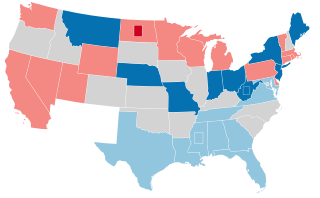
The 1910–11 United States Senate election were held on various dates in various states. As these U.S. Senate elections were prior to the ratification of the Seventeenth Amendment in 1913, senators were primarily chosen by state legislatures. Senators were elected over a wide range of time throughout 1910 and 1911, and a seat may have been filled months late or remained vacant due to legislative deadlock. However, some states had already begun direct elections during this time. Oregon pioneered direct election and experimented with different measures over several years until it succeeded in 1907. Soon after, Nebraska followed suit and laid the foundation for other states to adopt measures reflecting the people's will. By 1912, as many as 29 states elected senators either as nominees of their party's primary or in conjunction with a general election.
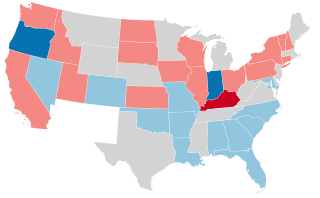
The 1908–09 United States Senate elections were held on various dates in various states. As these U.S. Senate elections were prior to the ratification of the Seventeenth Amendment in 1913, senators were primarily chosen by state legislatures. Senators were elected over a wide range of time throughout 1906 and 1907, and a seat may have been filled months late or remained vacant due to legislative deadlock. However, some states had already begun direct elections during this time. Oregon pioneered direct election and experimented with different measures over several years until it succeeded in 1907. Soon after, Nebraska followed suit and laid the foundation for other states to adopt measures reflecting the people's will. By 1912, as many as 29 states elected senators either as nominees of their party's primary or in conjunction with a general election.

George Wycliffe McBride was an American politician and businessman from the U.S. state of Oregon. An Oregon native, he served in the Oregon Legislative Assembly as Speaker of the House and as Oregon Secretary of State for two terms before election as United States Senator from Oregon. A Republican, he was the first native Oregonian to serve in the Senate. His father and two of his brothers were also politicians.
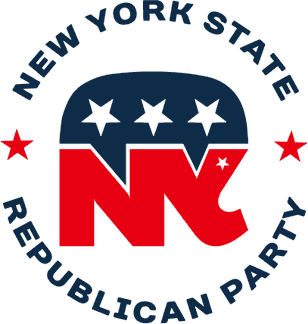
The New York Republican State Committee, established in 1855, is the New York State affiliate of the United States Republican Party (GOP). The party has headquarters in Albany, Buffalo, and New York City. The purpose of the committee is to nominate Republican candidates for election to New York and federal political roles. It also assists its nominees in their election campaigns.

Charles Frederick Scott was a United States House of Representatives from Kansas.
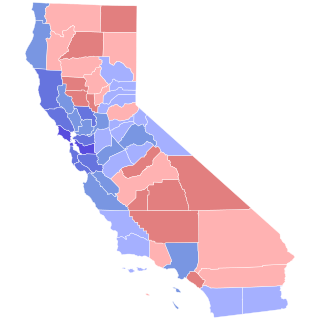
The 1992 United States Senate special election in California took place on November 3, 1992, at the same time as the regular election to the United States Senate in California. Feinstein defeated future California governor Gray Davis in the Democratic primary, while Seymour defeated William E. Dannemeyer in the Republican primary.

The 1899 United States Senate election in New York was held on January 17, 1899. Incumbent Democratic Senator Edward Murphy Jr. stood for re-election to a second term but was defeated by Republican Chauncey Depew. Republicans had maintained control of both houses of the legislature in the 1898 New York state election.

The 1905 United States Senate election in New York was held on January 17, 1905. Incumbent Senator Chauncey Depew was re-elected to a second term in office. He was renominated unanimously after former Governor Frank S. Black dropped his challenge, and easily won the election given the Republican Party's large majorities in both houses.

The 1909 United States Senate election in New York was held on January 19, 1909, by the New York State Legislature to elect a U.S. Senator to represent the State of New York in the United States Senate.
The 1911 United States Senate election in New York was held from January 17 to March 31, 1911, by the New York State Legislature to elect a U.S. Senator to represent the State of New York in the United States Senate.
The 1911 United States Senate election in Massachusetts was held during January 1911. Republican incumbent Henry Cabot Lodge won election to a fourth term despite intense opposition within his own party. Lodge received only five votes more than the necessary minimum for a majority.

The 1872–73 United States Senate elections were held on various dates in various states, coinciding with President Ulysses S. Grant's re-election. As these U.S. Senate elections were prior to the ratification of the Seventeenth Amendment in 1913, senators were chosen by state legislatures. Senators were elected over a wide range of time throughout 1872 and 1873, and a seat may have been filled months late or remained vacant due to legislative deadlock. In these elections, terms were up for the senators in Class 3.

The 1886–87 United States Senate elections were held on various dates in various states. As these U.S. Senate elections were prior to the ratification of the Seventeenth Amendment in 1913, senators were chosen by state legislatures. Senators were elected over a wide range of time throughout 1886 and 1887, and a seat may have been filled months late or remained vacant due to legislative deadlock. In these elections, terms were up for the senators in Class 1.

The 1890–91 United States Senate elections were held on various dates in various states. As these U.S. Senate elections were prior to the ratification of the Seventeenth Amendment in 1913, senators were chosen by state legislatures. Senators were elected over a wide range of time throughout 1890 and 1891, and a seat may have been filled months late or remained vacant due to legislative deadlock. In these elections, terms were up for the senators in Class 3.

















